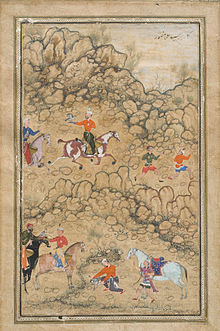Bairam Khan
| Bairam Khan | |
|---|---|
| بيرم خان | |

Prince Akbar and Noblemen Hawking, Probably Accompanied by His Guardian Bairam Khan
|
|
| Regent of the Mughal Emperor | |
|
In office 1556–1561 |
|
| Monarch | Akbar |
| Personal details | |
| Born | c. 1501 Badakhshan |
| Died | 31 January 1561 Sahastralinga Tank, Anhilwad Patan, Gujarat under Mughal Empire |
| Children | Rahim |
| Profession | Chief advisor of Akbar, Military commander and commander-in-chief of Mughal army and Mughal Statesman |
| Religion | Shia Islam |
| Military service | |
| Allegiance | Mughal Empire |
| Years of service | c. 1517-1561 |
| Rank | 45 |
| Commands | Mughal Army |
| Battles/wars |
Battle of Khanwa Battle of Ghaghra Siege of Sambhal Second Battle of Panipat |
Bairam Khan also Bayram Khan (Persian: بيرام خان) (died 1561) was an important military commander, later commander-in-chief of the Mughal army, a powerful statesman and regent at the court of the Mughal emperors Humayun and Akbar. He was also guardian, chief mentor, advisor, teacher and the most trusted ally of Humayun. Humayun honored him as Khan Khanan, which means king of kings. Bairam was originally called Bairam "Beg" but later became honored as 'Kha' or Khan.
Bairam Khan was born in the region of Badakhshan in Central Asia, and belonged to the Baharlu clan of an Oghuz Turkic, Kara Koyunlu tribe. The Kara Koyunlu had ruled Western Persia for decades before being overthrown by their Ak Koyunlu rivals. Bairam Khan's father and grandfather had been part of Babur's service.
Bairam entered Babur's service at the age of 16 and played an active role in the early Mughal conquests of India. Bairam Khan later contributed greatly to the establishment of the Mughal empire under Humayun when he was entrusted with the position of muhardar (keeper of the seals) and took part in military campaigns in Benares, Bengal and Gujarat. He accompanied Humayun during his exile in Persia and helped conquer Kandahar before serving as its governor for nine years. In 1556, he played a leading role as a commander in Humayun's reconquest of Hindustan.
Following Humayun's death in 1556, Bairam Khan was appointed Regent over the young monarch Akbar. As regent, he consolidated Mughal authority in northern India and most notably led the Mughal forces at the Second Battle of Panipat, which was fought between Akbar and Hemu in November 1556.
...
Wikipedia
